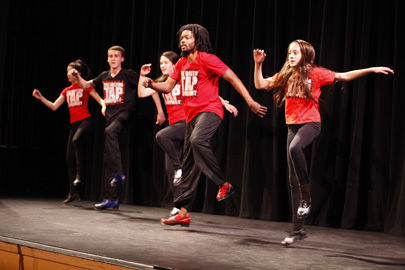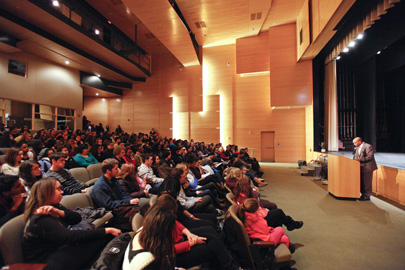Celebrating MLK's legacy
With music, dance and poetry, community remembers King's message
 Photos/Mike Lovett
Photos/Mike LovettThe Boston Tap Company performs at the Martin Luther King, Jr. memorial, "For the Love of the Dream!"

Professor Chad Williams hosts the event in a packed Shapiro Campus Center theater.
“The struggle for African American civil rights did not begin with Dr. Martin Luther King, Jr. So why do we come together this evening to celebrate his life and legacy?” said Chad Williams, chair of the African and Afro-American Studies Department and host of the celebration. “Quite simply, because if any American deserves a national holiday, deserves to be recognized and honored for advancing the very idea of progress in this country’s long, contentious racial history, for compelling each and every one of us to be better human beings, it is Dr. Martin Luther King, Jr.”
The 9th-annual memorial, “For the Love of a Dream!” included performances by Emmy Award-winning Sean Fielder and the Boston Tap Company, Brandeis’ own Kaos Kids, songstress Erica Barnett, Brandeis Bridge Fellow Malakani Mak, motivational speaker Jermaine Hamilton and talks by the MLK Scholarship students who fundraised for five African American and five Jewish students to travel to Israel together, and the keynote team of Jane and Hubert Sapp.
The event occurred in the same space, the former Ford Hall, in which a group of about 70 African-American Brandeis students, galvanized by King’s assassination, occupied for 11 days in 1969, demanding improvements in the campus racial climate, enhancements in the educational experience of black students and creation of more opportunities for future black students to attend the university. One of their demands was for the administration to create 10 scholarships named for King, which continue to be important tools of educational opportunity.
From a rousing performance of Sam Cook’s “A Change is Gonna Come” to the emotional poetry of Bronte Velez to a dramatic reading King’s famous “I Have a Dream” speech, the theater reverberated with the hoots and hollers, snaps and applause of an engaged and inspired audience.
Williams noted his students often ask how African Americans were able to withstand so much throughout history. “They did it with love. They did it with song…Dance has always been an integral part of how African Americans expressed their dreams of equality,” Williams said, who was moved by the evening’s performances.
Hubert Sapp, who was a special assistant to King in the early 1960s, recalled his memories of King and his work on behalf of him.
He described his boss as brilliant and people-oriented, and shared how important King’s anti-war stance became to his organizations and to his eventual notoriety. He and Williams noted that while King was willing to compromise, he was very strategic. Before the board of the Southern Christian Leadership Conference, which he headed, voted on their position on the Vietnam War, King told them he’d support their decision but in his capacity as a pastor, he’d continue to utilize any opportunity to speak out against it. The board voted unanimously to oppose the war.
Jane Sapp spoke to the youth in the audience, telling them to “Find that thing that you become so passionate about that you would be unwilling to compromise.
“I’m always excited when I have the opportunity to speak or sing or interact with young people,” Jane Sapp said. “We need you more than ever. We need your energy, your commitment, your voice.”
Categories: Arts, General, Humanities and Social Sciences





